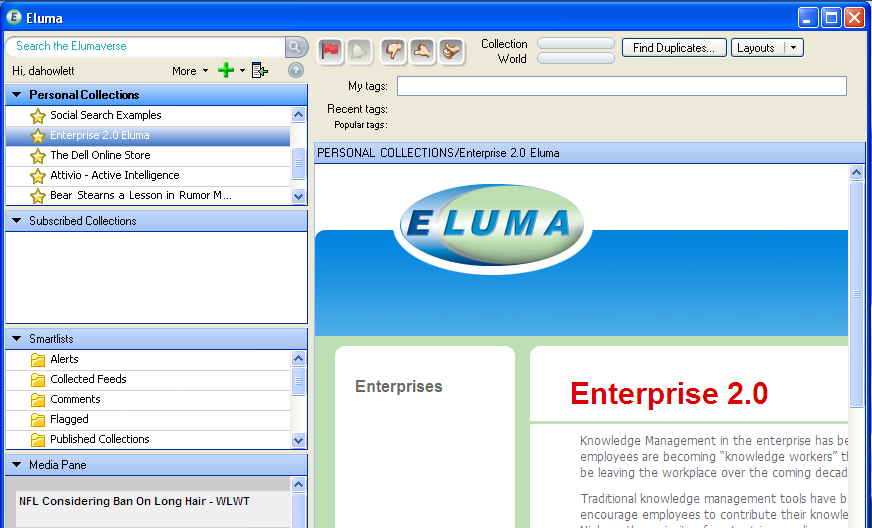Can Eluma break Nielsen's 1/9/90 rule? Try it and decide

It's not often I see a product or service that comes directly from the consumer focusing side of the development house and then positions itself as a business productivity tool but that's exactly what Eluma is trying to do.
Originally conceived as a tool to assist brand stickiness in version one, Eluma has taken the concept of creating collections of information found on the web and putting it onto the desktop for business use. This is not a new idea per se and at first glance, Eluma looks similar to a social bookmarking tool. Running against the current trend, this is a Windows only, desktop executable. It isn't offered as a service and is meant to work as a personal productivity tool. I can almost hear the howls of derision among those who believe in the all sharing world of today's Internet but here's why. When the company undertook its research prior to development of its V.2 offering, it found that 90-95% of people don't want to share information.
When I heard this, I instantly understood. Some while back I discovered that Jacob Nielsen's 1/9/90 rule holds absolutely firm. In recent work I have done elsewhere, it is a devil's own job to shift those numbers. There are many reasons why that might be the case but as at the early part of 2008, Nielsen's rule is holding up well.
According to the company's blurb: "Eluma shifts the emphasis from contributing for the benefit of the enterprise to organizing for the benefit of the self. As a result, Eluma gets used and populated more often than traditional knowledge management tools." Eluma reports that management likes this idea but is helping employees along by doing a certain amount of pre-populating of what it calls 'collections.' These are the high level gobs of stuff in which employees might be interested. According to Richard Buck, CEO and co-founder of Eluma: "We had no idea that enterprises had made collections that were helping spread use of the product because we're not providing an online service that allows us to aggregate download information."
Despite this apparently reactionary approach, Eluma doesn't prevent users from sharing with others through access to feeds it generates. It allows alert distribution so that important information doesn't get lost or overlooked. This alert distribution mechanism was what encouraged users to take up the product.
This had an interesting side effect. Offered as a free download, it acts like an anonymous opt-in where the user can share as much or as little as they wish. They can therefore use it at home for private use or for other business uses outside normal activities. "One person used it as a companion service to help arrange an entire 10-day trip to a country she'd never visited. As it is available offline, she always had full access to her itinerary, booking information, in fact everything she needed for the trip," says Buck.
Despite all the excitement around online services, I find these use cases fascinating. Eluma is reminding us there is a real world out there where assumed adoption of online services is far from a done deal in the business environment. Whether that remains the case is another matter. "If we were doing this again then we'd look closely at the AIR client for instance," says Buck. I rather suspect they will need to re-engineer for the Internet but not for the time being.
Today the company is relying on word of mouth and university campus activity. The company believes it can generate revenues from selective contextual search based advertising. I'm less sure of this model in the business market although I can see how it might work in situations where Eluma is being used both at home and work or where the using company is a retail based organization. The company also offers paid for services where the product needs modification for specific internal use.
Eluma is in private beta but here's a link for the first 100 ZDNet readers to bypass the 'wait in line' process. It's certainly worth a try for Windows only users.
